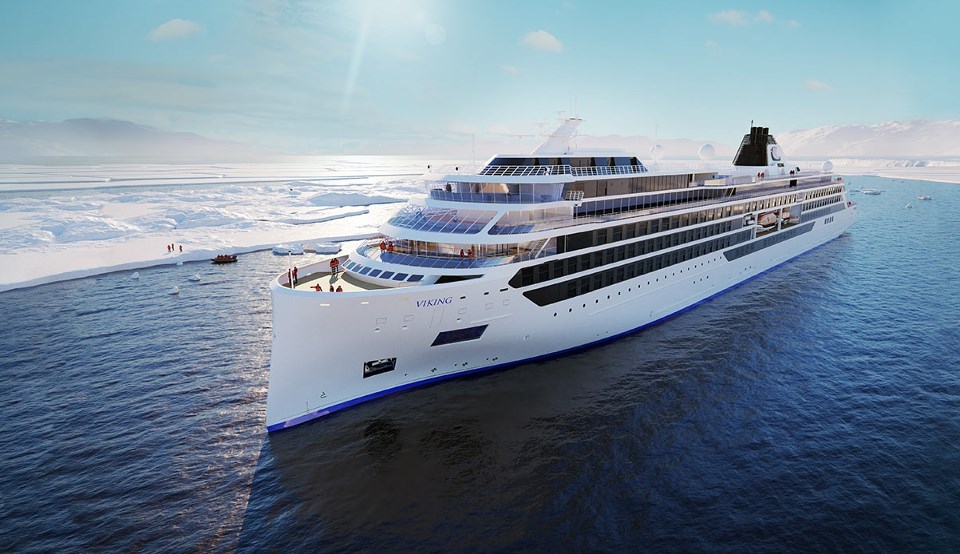COVID-19 has wiped out another year of cruise ship expeditions on the Canadian side of the Great Lakes.
The federal government has extended its national ban on large cruise ships on the Great Lakes due to the pandemic.
Transport Minister Omar Alghabra issued orders prohibiting cruise vessels carrying more than 100 people from operating in Canadian waters until Feb. 28, 2022.
Last year's temporary measures for cruise ships were set to expire on Feb. 28.
The ban doesn't provide any immediate hardship on the marine-oriented side of tourism in Thunder Bay. Its manager is looking ahead to next year when Viking Cruises makes its arrival in port with a brand new vessel.
"The vessels we are welcoming into Thunder Bay are both over 100 passengers so would fall under the extended prohibition," said Paul Pepe, manager of Tourism Thunder Bay, in an email.
Want to read more stories about business in the North? Subscribe to our newsletter.
The northwestern Ontario port isn't expecting any passenger ship visits until next year when Viking Cruises comes calling.
"We are still planning with a full season in mind for 2022 with Viking," said Pepe.
There's no national ban for smaller cruise ships certified to carry 100 or fewer people. But that's of no comfort to tourism groups like the Great Lakes Cruise Association.
"Sadly, none of our current Great Lakes fleet can economically operate with under 100 guests and crew onboard," said Stephen Burnett, executive director of the coalition, adding "we will have no cruising for the balance of 2021."
The Great Lakes Cruise Association is chaired by David MacLachlan, chair of Destination Northern Ontario with membership that includes Killarney Mountain Lodge and Conference Centre, Parry Sound, Red Rock, Sault Ste. Marie, Terrace Bay, Thunder Bay and the Town of Northeastern Manitoulin and the Islands.
But Burnett is optimistic of better days ahead.
"We are mightily enthused about the future because of the new cruise lines planning to be here in 2022 and beyond," he said.
"We totally respect the federal government’s decisions pertaining to the national health care and when the time is right we will be ready to restart the industry."
The coalition has a seat at the National Task Force for the Resumption of Cruising.
"We realize that when the borders reopen we will need to be ready to handle any guidelines necessary to safeguard the cruise guests, the crew and our communities ashore," said Burnett. "It would be fair to describe this preparatory work as massive and comprehensive, which it will need to be."
The cruise ship that would use Thunder Bay as a turnaround port was launched at a Norweigian shipyard just before Christmas. The 378-passenger Viking Octantis was "floated out" by Fincantieri on Dec.22.
Built as a polar-class 'Expedition' ship, the vessel is expected to make its maiden voyages to Antarctica and the Great Lakes in early to mid-2022.
The ship will be outfitted with an enclosed slipway to launch rigid inflatable boats, zodiacs and kayaks for shore excursions, and will house a 420-square-foot laboratory for academic teams to conduct research.
Cruise ships navigating Arctic waters could also be impacted by Ottawa's one-year extension of the ban.
The government's prohibition includes passenger vessels carrying more than 12 people on Canada's extreme north along with "adventure-seeking pleasure craft." Vessels used by Arctic residents will not be impacted.
Ottawa generally views cruise vessels as health risks and is advising Canadians to avoid travel on them outside of the country.
Ferries and water taxis are considered essential passenger vessels and still operate provided they follow local public health guidance and protocols to prevent the spread of COVID-19.
In a Feb. 4 news release, Transport Canada news said it will continue to evaluate the situation and make changes made as necessary.
"Temporary prohibitions to cruise vessels and pleasure craft are essential to continue to protect the most vulnerable among our communities and avoid overwhelming our health care systems," said Alghabra in a news release. "This is the right and responsible thing to do."
Those who don't comply with the pleasure craft prohibition could be subject to penalties of $5,000 per day for individuals and $25,000 per day for groups or corporations.




